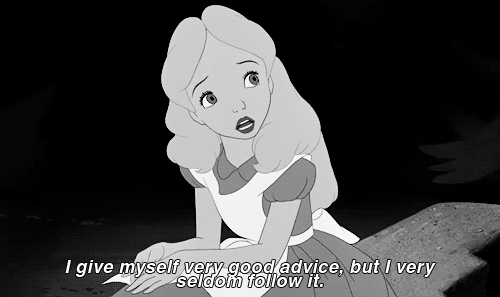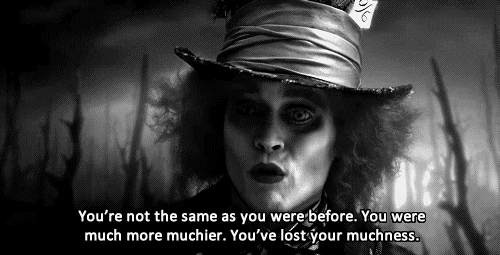The Case For Lightening Up, Letting Go — And FINALLY Living
All work and no play SUCKS.
 weheartit
weheartit “Don’t die with your music still inside you. Listen to your intuitive inner voice and find what passion stirs your soul. Listen to that inner voice, and don’t get to the end of your life and say, ‘What if my whole life has been wrong?” — Ralph Waldo Emerson
We all have a need to have fun in this game of life. Good humor is jovial, energizing, and attractive.
Biting sarcasm, on the other hand, is a clue to negative emotions hidden under the surface. If you have to experience humor at the expense of others —or even at your own expense by being self-deprecating — that is a sign you should consider exploring what is really going on for you in order to achieve more wholeness in your life.
Comedians often come from dysfunctional childhoods which they turn into comedy gold. Yet while they are funny on stage, their lives are sometimes haunted by the specter of drugs, depression, food addiction, and other mental health battles.
When accessed appropriately, however, play and fun can help all of us transcend the painful experiences in our past.
I believe we all can learn to lighten up. We can learn to take life seriously while not always needing to being serious. It's certainly a paradox worth exploring.
Many stories from children’s books bring nostalgic memories to our minds. These classic stories stay with us not only because we loved them as children, but also because they contain such wisdom for us as adults while simultaneously helping us reconnecting to the lost art of whimsy and playfulness in our lives.
Alice in Wonderland is one of my personal all-time favorite books.

This passage makes me smile as I remember my time as a child full of limitless imagination:
"The Caterpillar and Alice looked at each other for some time in silence: at last, the Caterpillar took the hookah out of its mouth and addressed her in a languid, sleepy voice.
‘Whoooooo are YOU?' said the Caterpillar.
This was not an encouraging opening for a conversation. Alice replied, rather shyly,`I — I hardly know, sir, just at present —at least I know who I WAS when I got up this morning, but I think I must have been changed several times since then.'
'What do you mean by that?' said the Caterpillar sternly.`Explain yourself!'
'I can't explain MYSELF, I'm afraid, sir' said Alice, 'because I'm not myself, you see.'
'I don't see,' said the Caterpillar.
'I'm afraid I can't put it more clearly,' Alice replied very politely, 'for I can't understand it myself, to begin with; and being so many different sizes in a day is very confusing.'"
As a business and life coach, I often wonder if we don’t discount the value of enjoyment for high performance on the job.

“I'm having too much fun at work,” is something I rarely hear these days but there is power in play, even for those in the most serious of careers. Play is NOT the enemy of work. In fact, neither work nor play can thrive without the other.
We need the newness of play — the sense of flow, the imagination, and the energy of being in the moment.
We also need the sense of purpose in work — the economic stability, the sense of meaning, and the feeling of competence.
The critical quality work and play have in common is creativity.
We need to be creative at both work and play in the way we approach new relationships, learn and hone our skills, and do what's needed to make things happen.
Play helps us deal with difficulties, handle challenges, and tolerate boring routines and negative emotions such as frustration. Play provides a sense of expansiveness that promotes the sense of mastery that is absolutely vital to the creative process.
What ever happened to unbridled joy in our daily lives?
Remember the fun of playing as children?
Nearly everyone starts out in life playing naturally with whatever’s available. We make rules up, invent games with playmates, fantasize, and imagine mysteries and treasures to explore.
We all need to renew ourselves more often through purposeful play.
Something happens to most of us as we become working adults. We shift our priorities into organized, competitive, and goal-directed activities. If an activity doesn’t teach us a skill, make us money, or further our social relationships, we don’t want to waste time on it being what we consider nonproductive.
Because of this, the sheer demands of daily life and family responsibilities seem to rob us of the ability to play.
“I have found that remembering what play is all about and making it part of our daily lives are probably the most important factors in being a fulfilled human being. The ability to play is critical not only to being happy but also to sustaining social relationships and being a creative, innovative person.” — Stuart Brown, MD
Dr. Stuart Brown presents his ideas in this TED TV video: Play Is More than Fun.
Sprinkling his talk with anecdotes demonstrating the play habits of polar bears and corporate CEOs, Brown, founder of the National Institute for Play, promotes play at every age.
He defines play as the following:
"Play is an absorbing, apparently purposeless activity that provides enjoyment, happiness, and a suspension of self-consciousness and sense of time. It is also self-motivating and makes you want to do it again."
We tend to underestimate the power of play.
Imagine our world without it — not only the absence of games or sports, but also the absence of movies, arts, music, jokes, and dramatic stories. No daydreaming. No teasing. No flirting. Play is what lifts people out of the routine of the mundane and offers a means to find happiness in even the littlest things.
When we stop playing, we stop growing. Rather fully experiencing our vitality as we age, we simply coast towards our impending death.
It’s obvious that play outside of work through sports, games, family activities, and community functions is essential.
What is less obvious is our need to play at work, as we work.
Playing as we work energizes us, helps us to see new patterns, sparks curiosity, and triggers ideas and innovation. Playing as we work helps us deal more efficiently and strategically with problems as they arise.
What kind of play is appropriate at work? You don’t have to engage in off-site team-building games to play at work, although those are occasionally beneficial.
A playful attitude gives people the emotional boost they need to rally. Play acts as a lubricant that allows individuals to feel a bond with each other.
When we play, we're less likely to put up defensive walls. We accept others as they are. We feel a greater responsibility to play fair. And when our interactions are based on a foundation of caring, we make a concerted effort to avoid hurting others.
Play enables cooperative socialization and nourishes trust, empathy, caring, and sharing. Playfulness leads to broadened imagination, inventiveness, and dreams — all of which help us think up new solutions to even the most complicated problems.
The important relationships in your life — work relationships included — are always more vibrant when they involve love and laughter!
For more information about finding peace and other similar concepts, see DrPatWilliams.com. Also read Dr. Pat Williams's new book, Getting Naked: On Emotional Transparency at the Right Time, the Right Place, and with the Right Person on Amazon or Balboa Press and in Audible books.
YourTango may earn an affiliate commission if you buy something through links featured in this article.

